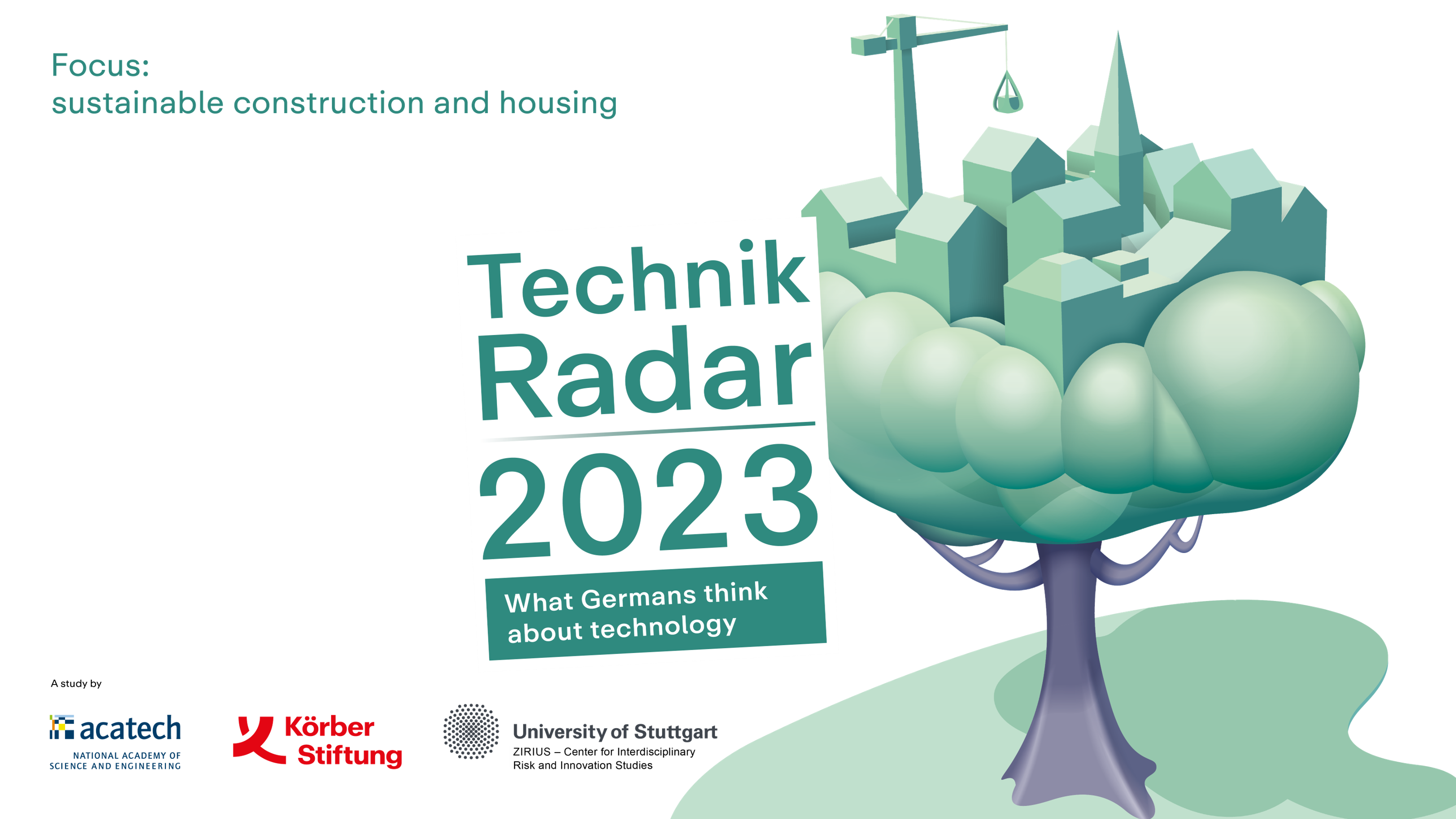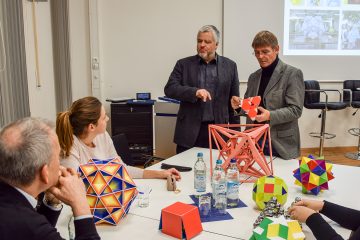New study reveals what Germans think about technology

Berlin, 25 May 2018
TechnikRadar is a survey carried out by acatech – National Academy of Science and Engineering and the Körber Foundation to find out what Germans think about technology. The representative study, which was presented on 25 May in Berlin, will now be produced on a regular basis in order to highlight possible problems associated with technological change.
89.5 percent of people in Germany believe that it is impossible to halt technological progress, while 60.2 percent think that progress is accompanied by growing pressures on the individual. These are among the findings of TechnikRadar 2018, a study analysing the results of a representative survey carried out by acatech – National Academy of Science and Engineering and the Körber Foundation, the first ever edition of which was presented in Berlin today. Although almost everyone in Germany believes that change cannot be prevented, 68.7 percent of respondents thought that the public should have a say in the future of controversial technologies.
Technology should reflect social values
Germans are sceptical about technology’s potential to solve problems: only 24.6 percent felt that it solves more problems than it causes. Approximately one third of those who took part in the survey (32.9 percent) thought that technology can help to solve challenges such as hunger, poverty and climate change. As far as the uses of technology are concerned, there was a strong feeling among the respondents that it should be used for the benefit of society. A clear majority of 73.7 percent said that technology should reflect social values such as justice and protecting the environment. Just under a quarter (24.9 percent) said that they would only describe technological innovations as positive if they benefited them personally.
Despite their scepticism, Germans do see a number of positive aspects, too. “Almost one in two respondents expected technology to improve living standards for future generations, although this view was more common among men than among women”, says the project’s lead researcher Cordula Kropp, a sociologist at the University of Stuttgart’s Center for Interdisciplinary Risk and Innovation Studies. She adds that “Germans feel differently about different technologies. While they have reservations about employing robots to help nursing staff, they are much more positive about the use of renewable energy to combat global warming”.
Digital technology threatens to take away control
Germans have mixed feelings about digitalisation and its repercussions. While a majority (54.5 percent) think that it will make their lives more convenient, a similar number (60.6 percent) also worry that they will lose control over their own data. A large majority of 80.8 percent believe that the use of robotic nurses will mean that patients receive less human contact, and 52.9 percent fear that it will lead to only the rich being able to afford human care in the future. People in Germany are even more sceptical about autonomous driving. Just 18 percent believe self-driving cars to be reliable, while only 16.2 percent of people who can drive would be willing to hand over full responsibility for driving to the vehicle. A large majority (67.4 percent) are worried that accidents could be caused by hackers. Similar concerns exist with regard to smart home technologies, with 67.9 percent of those who took part in the survey fearing that cybercriminals could take over their homes. Just 8.1 percent of respondents currently use smart home solutions.
Young people are most concerned about their personal data
The groups most concerned about their data security are the better educated, people with a background in science and technology, members of the upper middle class and above, and young people. As a rule, however, young people are more positive about digitalisation than older people, while men tend to be more positive than women. Older women in particular are likelier to have a more sceptical attitude, not just towards digitalisation, but towards technology in general. Almost half of women over the age of 65 (47.3 percent) think that technology causes more problems than it solves, whereas the equivalent figure for men under the age of 35 is just one fifth (19.4 percent). The finding that women are less likely than men to trust technology is nothing new. However, one unexpected result was a difference in attitudes between eastern and western Germany: approximately 37 percent of women in western Germany thought that technology will improve the lives of future generations, but this rose to over 62 percent in the east.
The public wants its say – and TechnikRadar can provide an early warning system
According to Lothar Dittmer, Chairman of the Executive Board of the Körber Foundation, “What really interests the German public isn’t technology itself, but the role it plays in society – the goals it is used to pursue and the consequences of its use. TechnikRadar hopes to make a contribution to this badly needed debate on the role of technological innovations and how they are shaped and regulated.” Project leader Ortwin Renn, a member of acatech’s Executive Board and Scientific Director at the IASS Potsdam, adds that “We intentionally designed our annual monitoring programme to operate as a long-term early warning system so that problems associated with technological change can be detected as soon as possible. Ideally, the support we provide to innovation processes will help to ensure that products and technologies meet the expectations of both their users and the people affected by them.”
About TechnikRadar
TechnikRadar is a survey carried out by acatech – National Academy of Science and Engineering and the Körber Foundation to find out what Germans think about technology. It is based on a regular, nationwide, representative survey that was developed in accordance with current standards in the social sciences. The results are analysed using empirical social research methods. It is produced by the University of Stuttgart’s Center for Interdisciplinary Risk and Innovation Studies (ZIRIUS). A total of 2,002 people were surveyed in 2018. The theme of this year’s survey was digitalisation.



